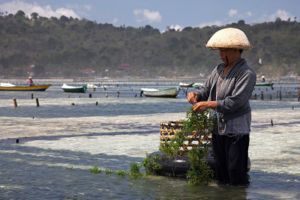Food/Open ocean farms
Open ocean farming is currently being researched by several companies and universities. Floating nets are used to grow edible seaweeds ("sea vegetables"), and floating or submersible cages are used to breed fish in. As with all water-based agriculture, the plants grow about 10 times faster than with land-based agriculture. Inedible seaweeds can converted efficiently into edible fish; 4 tons of seaweed feed will typically yield 3 tons of fish.
Ocean farms will be most productive, labour-free and sustainable if they follow the principles of agroecology; high-input monocultures at sea have the same problems as they do on land. In a marine agroecosystem, fish and shellfish do not even require feeding; they feed on plankton that drift in from the open sea. Seaweed grown in ocean farms can even be used as fertilizer for land-based growing.
This presentation from researchers at Wageningen University calculates that less than 240,000km2 of open ocean farms worldwide would provide all the protein needs for 9.3 billion people. This is a modest amount of space to dedicate to ocean farming; it is about the size of Madagascar and could be spread across offshore areas near population centres. (Most people live near coasts.) Realistically, ocean farms will be only one of several protein sources, so this large an area will not be necessary.
- Ocean Farm Tech use floating geodesic spheres that hold fish inside
- Ocean Harvest Technologies grow seaweed on floating nets
- http://oceanfarmtech.com/news.htm - lots of links
- http://www.openblueseafarms.com/who_we_are/our_company.html
